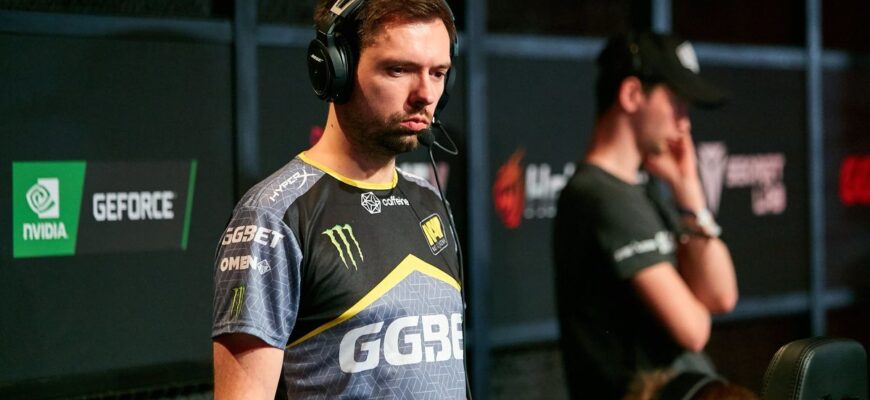Following a decisive exit from the BLAST Open London 2025 closed qualifiers, Natus Vincere`s Counter-Strike 2 coach, Andrii “B1ad3” Horodenskyi, offered a candid and pragmatic assessment of his team`s performance. Far from a desperate plea for time, B1ad3`s comments underscore a methodical approach to team development, emphasizing persistent effort and strategic patience over the pursuit of immediate, fleeting victories.
A Realistic View: Beyond the Immediate Defeat
NAVI`s journey through the BLAST qualifiers saw them secure an initial victory against Fnatic, only to fall to FaZe Clan and subsequently M80, prematurely ending their run. While an exit from a significant qualifier is rarely met with enthusiasm, B1ad3`s reaction was notably measured. He distinguished the recent M80 loss from previous disappointments, specifically recalling the defeat to 3DMAX as a more significant setback.
“I don`t think the match against M80 was the most disappointing. It was worse after the loss to 3DMAX. We need to be realistic: we just need to work more. This won`t take just one day; we need to play tournament after tournament.”
This perspective is crucial. It suggests a coach who is not swayed by the outcome of a single match but instead evaluates performance within a broader developmental trajectory. The M80 loss, in this context, appears to be less a catastrophic failure and more a data point in an ongoing process of refinement.
The Grind and the Grand Strategy
The phrase “we just need to work more” might sound deceptively simple, even a cliché in the competitive esports lexicon. Yet, B1ad3`s elaboration provides a deeper insight. He stresses that improvement is not an instantaneous phenomenon but a cumulative effort accrued over “tournament after tournament.” This commitment to a sustained grind is often the silent engine of top-tier performance, contrasting sharply with the often-demanded instant gratification from fan bases.
Furthermore, B1ad3 revealed that NAVI`s current strategy is designed with a horizon of two to three tournaments. This isn`t a team expecting to dominate overnight. Instead, it`s a squad in a deliberate phase of evolution, where initial results serve as diagnostic tools rather than definitive judgments. This long-term strategic outlook is a hallmark of resilient teams, suggesting that NAVI is building for endurance rather than ephemeral glory.
The Intricacies of Team Development: Synergy and Decision-Making
One of the primary challenges for any esports roster, particularly one undergoing changes or adapting to a new game like CS2, is the development of intrinsic synergy and consistent high-quality decision-making. B1ad3 points directly to this, stating:
“This roster needs more time for us to make better quality decisions. I think that`s the main problem.”
This isn`t just about individual skill, which NAVI`s players possess in abundance. It`s about the complex interplay of five minds operating as one cohesive unit under immense pressure. Factors contributing to this include:
- Communication Protocols: Refining how and when information is shared during intense rounds.
- Role Adaptations: Players settling into and excelling within their specific strategic roles.
- Strategic Depth: Developing a wider playbook of tactics and counter-tactics.
- Clutch Factor: Consistently making optimal choices in high-stakes, game-deciding moments.
These elements are not easily coached or learned in a vacuum; they are forged in the crucible of competitive play, requiring countless hours of practice and live tournament experience. It`s a technical dance where every player`s movement and thought must be synchronized, a feat that only comes with significant investment of time and effort.
The Competitive Crucible: A Path Paved with Persistence
The world of Counter-Strike 2 competitive play is unforgiving. Teams rise and fall with astonishing speed, and the margin for error is razor-thin. B1ad3`s calm analysis, therefore, is not a sign of complacency but rather a deep understanding of the competitive landscape. There`s no critical panic, he asserts, because the current phase is merely part of a larger, pre-defined developmental arc.
For NAVI, a team with a storied history and a legacy of champions, the pressure to perform is immense. However, B1ad3`s philosophy suggests a grounding in process, a commitment to fundamental improvement that transcends the immediate glare of public scrutiny. While fans crave instant success, the coach is focused on laying a robust foundation, recognizing that true mastery is a marathon, not a sprint.
Looking Ahead: A Testament to Patience
B1ad3`s post-match comments serve as a valuable reminder that professional esports, at its highest echelons, is as much about strategic planning and psychological resilience as it is about raw mechanical skill. NAVI`s path to the top tier of CS2, especially with roster adjustments and the game`s evolving meta, is clearly envisioned as a multi-stage process. The expectation, it seems, is not merely to win but to build a consistent, dominant force capable of making “higher quality decisions” when it truly matters. Fans of NAVI, and indeed of esports development, would do well to heed B1ad3`s call for realism and patience: the work is ongoing, and the potential, he believes, is still waiting to be fully unlocked.









